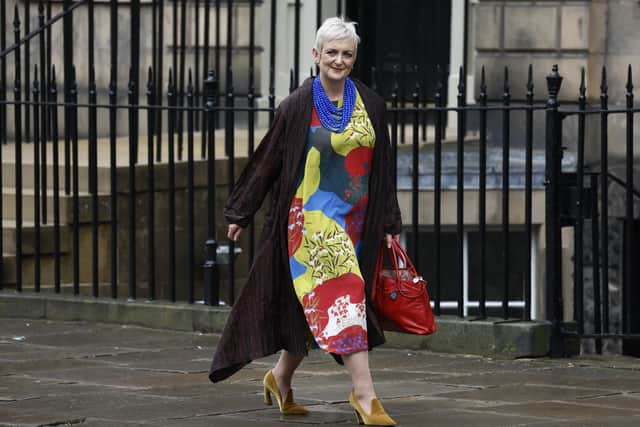Scottish Government ministers urged to 'go back to drawing board' on judge-led trials plan
The Scottish Government has been urged to “go back to the drawing board” over its plans for serious sexual offence trials to be held without juries amid a growing backlash from the legal profession.
The Government is behind moves to allow a single judge to decide on rape and attempted rape cases as part of “bold” legal reforms designed to bolster conviction rates and ensure that “justice is better served”.
Advertisement
Hide AdAdvertisement
Hide AdThe proposal, previously mooted in a report by a review group led by Lady Dorrian, one of Scotland’s most senior judges, is included in the Government’s Victims, Witnesses and Justice Reform (Scotland) Bill, which has yet to be passed by Holyrood.
However, three bar associations in Edinburgh, Glasgow, and Aberdeen have now said their members will not take part in the pilot scheme, raising doubts over whether the initiative could proceed, given it requires the consent of accused parties.
Now, Jamie Greene, the Scottish Conservatives’ shadow justice secretary, has urged the Government to “fully engage” with the legal profession and victims and produce revised reforms.
Over the weekend, justice secretary Angela Constance defended the plans, and said she wanted to work in a “spirit of partnership” with lawyers. “The status quo isn't an option,” she said. “If it's not now, when? And if it's not this, what?”
The Government has said the pilot of single judge trials will allow for evidence to be gathered as to their effectiveness, with Ms Constance pointing to the fact that over the past decade, just 46 per cent of rape and attempted rape trials resulted in a conviction, compared to 88 per cent of criminal cases across all offences.


The Government also says there is compelling evidence jurors are influenced by rape myths, which prejudice how they regard the complainant. Those myths can include expecting a genuine victim to try to fight off or escape an attacker, or that they would immediately report the crime to the police, or would become emotional when giving evidence in court.
But Mr Greene said such fundamental changes to the justice system required the support of those who work in it.
“Any proposed reform of this magnitude has to carry the legal profession with it if it is to have any chance of getting off the ground,” he said. “This is clearly not the case with the SNP plans for jury-less trials in rape cases and the decision by the Glasgow and Edinburgh Bar associations to boycott the pilot scheme renders it untenable.
Advertisement
Hide AdAdvertisement
Hide Ad“While reform is essential to create better outcomes in rape and sexual assault cases, I agree with legal experts that the right to trial by jury in the most serious cases is fundamental to the Scottish justice system.”
He added: “Angela Constance must go back to the drawing board, fully engage with victims and the legal profession and then redraft her reforms. We all want to see a fairer justice system – something my victims law would create – but the proposals have to command the support of stakeholders.”
Victim Support Scotland said it does not believe the existing system of trial by jury is suitable for the prosecution of serious sexual offences, pointing to research that highlighted it is difficult for jurors to understand complex legal arguments and matters of law. It has supported the new pilot, adding it has confidence “the knowledge and experience of the judiciary will lead to a more just outcome for survivors of sexual offences”.
Rape Crisis Scotland has also backed the plans, arguing judges are legally trained in a way that juries are not, and are less likely to be distracted by “irrelevant or collateral issues”.
But former senior judge Lord Uist is among those who have spoken out against the changes. He described the plans as "constitutionally repugnant", accusing ministers of "treating the courts as forensic laboratories in which to experiment with their policies”.
On Monday, Ian Woodward-Nutt, the vice-president of Aberdeen Bar Association, said the Government’s proposals were “deeply troubling”.
He told The Herald: “It is essential to understand that in many rape cases it is hard for the prosecution to prove a case beyond reasonable doubt. That is not due to some deficiency in the system that requires to be rectified, rather it is the inevitable consequence of the background circumstances in cases of this type.
“For the Government to consider it appropriate to attempt to engineer higher conviction rates and for them to try to do so by removing the essential safeguard of trial before a jury is deeply troubling. That is why defence lawyers in Aberdeen and the north-east of Scotland have declared they will not accept instructions in cases proceeding by way of this experimental scheme.”
Advertisement
Hide AdAdvertisement
Hide AdResponding to the news of the boycott, Ms Constance said: "It is disappointing that some criminal defence lawyers oppose a recommendation of a review carried out by Lady Dorrian, Scotland's second most senior judge, to improve how the justice system treats rape victims by piloting judge-only rape trials.
"There is overwhelming evidence that jurors are subject to preconceptions about rape that can impact the verdicts they reach, which is not the case in other serious crime trials. Over 80 per cent of criminal trials in Scotland are already conducted without a jury.”
She added: “We have worked closely with the legal sector and will continue to do so during the development and evaluation of the pilot."